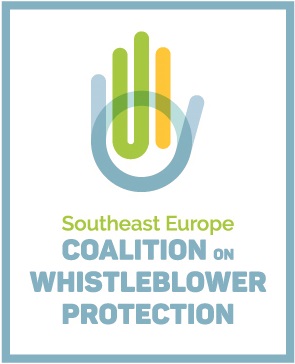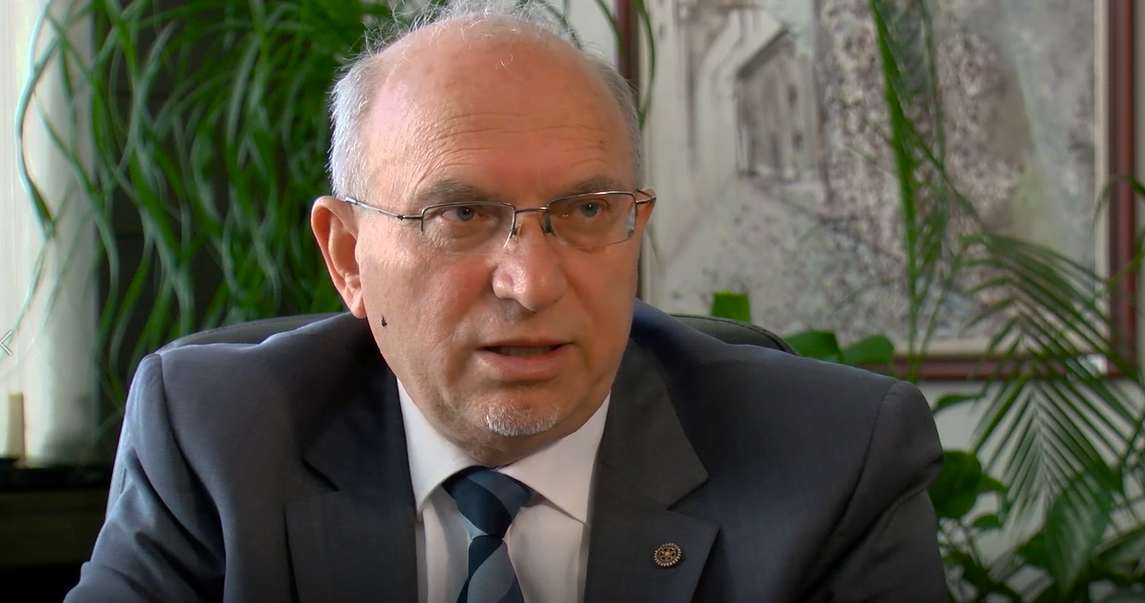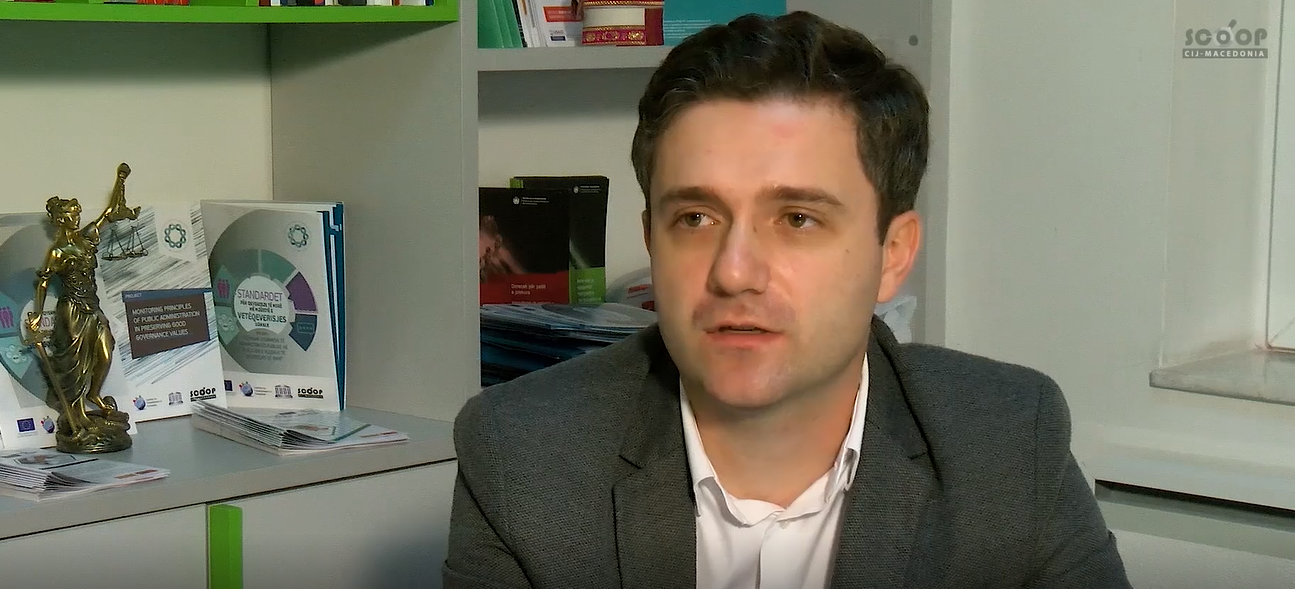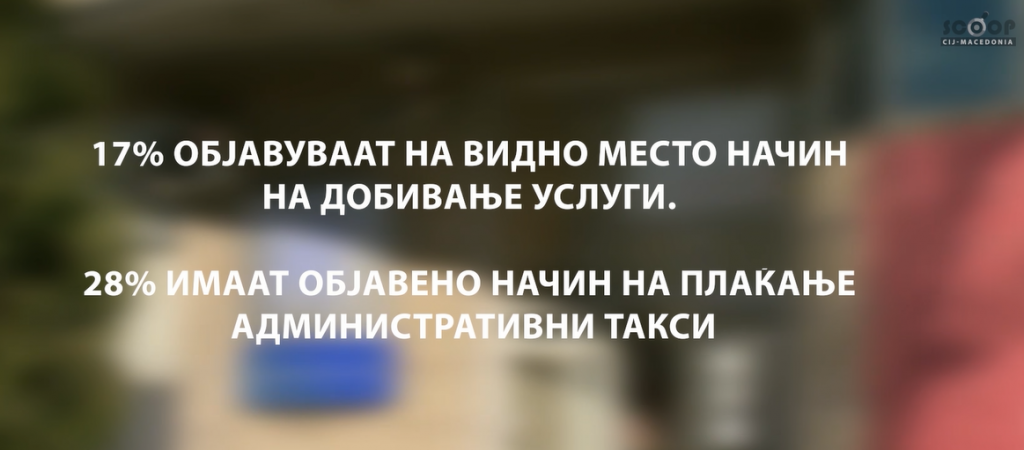- Only 15% of the municipalities are securing the documents from other institutions
- The minister Damjan Manchevski announced reducing of administration workers. Some of them will be transferred to the private sector
- Professor Borche Davitkovski: We want to reduce the administration, and on the other hand for the people not to be fired
Goran Lefkov
Citizens are often forced to wander from institution to institution for an ordinary document. The administration, including that of the local government, should aim to provide services according to the citizens’ needs, and provide them in a quality and efficient manner. The Minister is also dissatisfied with the local administration.
“There are people who do nothing. Neither even enough, nor as it should be done, so these compensate for them”, Damjan Manchevski, Minister of Information Society and Administration said to us.
The research within the project “Monitoring the principles of public administration in preserving the values of good governance”, conducted in the period August-December 2017 focused on analyzing the services offered by all municipalities in the country, with the participation of 14 local civil society organizations.
The SCOOP team went to Kumanovo, to visit one of the re-grants of this survey. “JEF Macedonia” investigated the municipalities of Kumanovo, Kriva Palanka and Kratovo.
“In the municipality of Kumanovo where I live, citizens complain that they are sometimes sent to several institutions to receive one service, they are sent from one institution to another to obtain more documents”, Talat Agush, member of “JEF Macedonia” stated.
EVEN OBLIGATED BY LAW, 85% OF MUNICIPALITIES DO NOT PROVIDE THE DOCUMENTS
Although the municipalities declaratively state that they provide documents ex officio from other institutions, in practice only 15% of the municipalities do it, while most provide only certain documents ex officio, mostly related to cadastral services.
“We need to improve the efficiency of the services we offer. One of the mechanisms, which we are starting to implement from December, is opening the first office for one service point where we will place 9 institutions that most often have contact with the citizens, at the same place for services”, Damjan Manchevski, Minister of Information Society and Administration believes.
The Municipality of Veles is preparing for a modern facility that should be in function of the citizens and where in one place they will receive a few services
Ace Kocevski, Mayor of Veles says:
“We want to create a modern customer service center, following the example of front office and back office, so that citizens can receive all services in one place regardless of whether they receive them from the local or central government” and continues: “In one place citizens to come and obtain a birth certificate, a marriage certificate, ID cards, a driving license, registration documents, a title deed, to pay taxes, a gun license and even to have a counter on Macedonian Post here to regulate the payment rather than go from one counter to another as state institutions are scattered in many places in the city”.
SERVICES SHOULD BE ONE-STOP SHOP
According to the Law on General Administrative Procedure, adopted in 2015, the services offered at both central and local level should be a one-stop shop, i.e. citizens no longer have to provide the necessary documentation from other institutions, and this will be done by the institution itself. The aim is to facilitate the administrative procedure in the interest of the citizen and the business sector, saving them time and unnecessary costs.
Legal experts believe that the Law on General Administrative Procedure should be obeyed and that it is municipalities’ obligation not to refer citizens or to promise them to change the law.
Borche Davitkovski, Professor at the Faculty of Law explains:
“I am listening to our mayor, the Skopje mayor, unfortunately a lawyer, saying: I will pass a rulebook by which the administration will solve the citizens’ cases within 15 days. I cannot believe what he is saying. How can this be done when we have a law on general and administrative procedure, it is the tool of the organs they work with. It is nicely written that within 30 days the procedure should be completed, a more complex case 60 days. It is mandatory for all organs. A mayor cannot impose something with his own rulebook. It is nonsense”.
Researches by the Center for Change Management have shown that a small percentage of employees in municipal administrations are directly involved in working with citizens.
“About 23% of employees have direct contact with clients. When talking about direct contact we talk about counter staff or other people who serve or communicate with citizens in any way”, Martin Todevski, from Center for Change Management emphasizes.
In addition to the fact that only few employees work with clients, the number of those trained to receive citizens’ demands is even lower.
“Only half of these employees who have direct contact with the parties have undergone some training in delivering services, quality of services for communication with clients”, Todevski adds.
Minister Damjan Manchevski is also dissatisfied with the manner of functioning and the administration training. He stresses that the Inspectorate has no capacity to make a check.
“This is yet another indication of how much the laws have been implemented and how feasible they are. Under the law, they are obliged to attend at least 5 trainings a year. It is impossible, we have a small capacity of the inspectorate, to check all institutions how much training they have attended. It is not always simple to do this”, Manchevski stresses.
It is important for citizens to have the necessary information on how they can receive the service in the municipality, which forms they need to fill in, how and where to pay the administrative fees, etc. A number of municipalities have set up a counter where citizens could be informed about the services offered, but from the on-site inspection it is concluded that most of them are not functioning.
Martin Todevski, from the Center for Change Management explained that municipalities should have enough channels for communication with the parties or to inform them enough how they need to complete a particular service. “Within our project, we visited all the municipalities to inform us how the field services are provided. The data showed that only 17% of the municipalities publish in a prominent place how receive the services. Only 28% have posted how to pay administrative fees, and 25% have printed forms or the forms are available on site”, he adds.
The public opinion poll conducted in this project in all municipalities showed that most respondents are neutral regarding how satisfied they are with the work of counter employees, and only 13% of the citizens are satisfied with it. For the mayor of Veles, part of the reasons lie in the municipalities’ finances.
MUNICIPALITIES COMPLAIN OF WEAK FINANCIAL CAPACITIES
Ace Kocevski, Mayor of Veles says:
“The situation is dramatic, I would say even alarming. Municipalities do not have enough financial resources to successfully carry out legally entrusted competences and provide quality services for citizens”. He expects that in the upcoming period fiscal decentralization is to be worked on. “At the moment fiscal decentralization is a bottleneck, Macedonia is considered one of the fiscally most centralized countries in Europe, the pie from public consumption is still small or from the GDP that is consumed locally, compared to the pie which is at the state level. Of the total public consumption, in Macedonia it ranges between 5-6%, in the EU it is somewhere above 12%, depending from a state to a state. It depends on what is included in those comparative indicators”, he stated.
The Municipality of Studenichani confirms that finances are a problem for them, but they say that anyway they are trying to solve the problems with such small administration.
“Are they satisfied? A year ago we had elections and the same mayor won the trust of the citizens. He was also a mayor the previous mandate.”, Burhaedin Nuhiu, Secretary of the Municipality of Studenichani says.
The central government announces administrative reforms that will allow the business more flexible administration and rationalization of the state institutions.
According to Damjan Manchevski, Minister of Information Society and Administration “the benefit for the state will be that it will pay less money for salaries, businesses will get less labor because they will now receive subsidies for these people’s salaries. “These people will not have their job uncertain. Here, they will find themselves much more useful and more fulfilled in the real sector”, he believes.
Local self-government experts disagree with such views.
Borche Davitkovski, Professor at the Faculty of Law explains:
“It is a fashion in our country to make reforms without firing. I have not seen it, maybe somebody will win a Nobel Prize in Macedonia for this to be done. In the 1980s England made that reform, America did it, Germany and everyone has made a public administration reform, but they were sick, there were layoffs. Here is neighboring Serbia that has done it and dismissed 35,000 people from the public administration. We want to reduce the administration without layoffs, we will allegedly offer them to the private sector. No fool from the private sector would employ someone from administration to drink coffee all day.”
Municipalities need to reform the services that are offered at the counters, at the time of development and expansion of the use of computers and the Internet, municipalities should also invest in providing electronic services as an alternative to the physical ones. The obtained data show that the municipalities do not offer e-services very much. They are mostly services organized by central state institutions that manage unified electronic systems, such as electronic building permits from the Ministry of Transport and Communications.
“This was produced with the financial support of the European Union within the project ‘Monitoring Principles of Public Administration in Preserving Good Governance Value’. Its’ contents are the sole responsibility of and do not necessarily reflect the views of the European Union”
“The story is supported within the NED project “Promoting accountability through investigative reporting”










